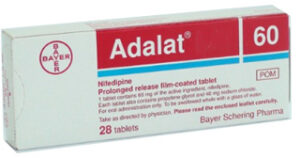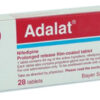Adalat is a medication that belongs to the class of drugs known as calcium channel blockers. Its generic name is nifedipine. Adalat is commonly used to treat high blood pressure (hypertension) and to prevent certain types of chest pain (angina). It works by relaxing and widening blood vessels, allowing for better blood flow.
< h2>When Not to Take Adalat
Adalat should not be taken in certain situations due to potential risks and complications. It is contraindicated in individuals who:
- Are allergic to nifedipine or any other ingredients in Adalat
- Have had a heart attack within the past two weeks
- Suffer from severe low blood pressure (hypotension)
- Have aortic stenosis (narrowing of the heart’s major blood vessel)
Side Effects and Solutions
Like any medication, Adalat may cause side effects. Common side effects include:
- Headache
- Dizziness or lightheadedness
- Flushing (redness or warmth of the skin)
- Swelling in the ankles or feet
If these side effects persist or worsen, it is important to consult a healthcare professional. In rare cases, Adalat may cause more severe side effects such as:
- Fast or irregular heartbeat
- Severe dizziness or fainting
- Shortness of breath
- Yellowing of the skin or eyes
If any of these serious side effects occur, immediate medical attention is necessary.
Taking Adalat Safely
When taking Adalat, it is important to follow certain guidelines:
- Take the medication exactly as prescribed by your doctor
- Swallow the tablet whole, without crushing or chewing
- Adalat can be taken with or without food, but should be taken consistently the same way each time
- If a dose is missed, take it as soon as remembered unless it is close to the next scheduled dose. In that case, skip the missed dose and resume the regular dosing schedule.
- Do not double the dose to make up for a missed one
- In cases of overdose, seek immediate medical attention or contact a poison control center. Symptoms of overdose may include severe dizziness, fainting, and slowed heart rate.
Understanding Drug Interactions
Adalat may interact with other drugs and substances, potentially affecting its effectiveness or increasing the risk of side effects. Some known drug interactions include:
| Drug | Interaction |
|---|---|
| Cimetidine | May increase the concentration of Adalat in the blood, leading to an increased risk of side effects |
| Grapefruit juice | Can increase the levels of Adalat in the blood and enhance its effects, leading to potential toxicity |
It is important to inform your healthcare provider about all medications, vitamins, and herbal supplements you are taking to avoid any potential interactions.
Inquiring About Adalat
- Is Adalat safe to take during pregnancy?
- Adalat is generally not recommended during pregnancy as it may harm the developing baby. It is important to discuss all potential risks and benefits with your doctor.
- Can Adalat be used by individuals with liver problems?
- Individuals with liver problems may need an adjusted dose or close monitoring when taking Adalat. Consult your doctor for further evaluation and guidance.
- Is it safe to consume alcohol while taking Adalat?
- Alcohol may increase the blood pressure-lowering effects of Adalat and worsen side effects. It is advised to limit or avoid alcohol consumption while on this medication.
- Can Adalat cause interactions with herbal supplements?
- Adalat may interact with certain herbal supplements, such as St. John’s wort, leading to reduced effectiveness or increased side effects. It is crucial to inform your doctor about all supplements you are taking.
- What should I do if I experience severe dizziness while taking Adalat?
- If severe dizziness occurs, it is recommended to sit or lie down to prevent falling. Contact your healthcare professional for further guidance and evaluation.


Reviews
There are no reviews yet.